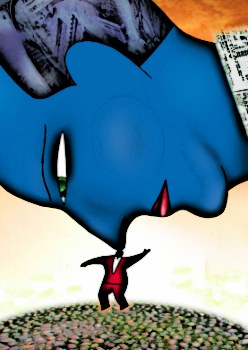 |
| November 13, 2012 | Volume 08 Issue 42 |
Designfax weekly eMagazine
Archives
Partners
Manufacturing Center
Product Spotlight
Modern Applications News
Metalworking Ideas For
Today's Job Shops
Tooling and Production
Strategies for large
metalworking plants
Lean leadership:
Lean coach says, 'What do you think?'

We will soon host our first lean summit (December 4-5, 2012) devoted to the topic of coaching, an event that marks the importance of this topic to lean practice. The essence of lean leadership is to develop people through getting the work done. To do so requires mastery of coaching, and mastery of coaching involves a blend of technical and social skills. I've been fortunate to benefit from the expertise of a number of outstanding coaches over the years. Perhaps you have, too.
Have you ever had a new coach -- or "sensei" -- visit your operation for a gemba walk and promptly contradict everything you've been working on under the tutelage of your previous or regular sensei? If you have worked with a sensei and had another sensei come visit, I can almost guarantee you've had this experience.
I can't tell you how many times I've received an emergency phone call from implementation leaders in exactly this circumstance. It's important to reflect on why the sensei might have done this.
Many of us have a tendency to try to copy a given solution to new situations. Yet, solutions are almost always case-by-case. So, what you thought was a contradiction was actually just your misunderstanding that sensei B contradicted sensei A; he was actually trying to make a different point.
On the other hand, there may have indeed been a contradiction between the two sensei. In fact, there is nothing some sensei enjoy more than contradicting the instructions of another sensei. They are trained that way.
So, what do you do? First, don't lament -- think. These situations are GREAT learning opportunities, among the best of all growing opportunities. Begin by presuming that the contradictory advice from the sensei are BOTH correct.
Your challenge will be to find a way to reconcile the apparent contradiction. You need to reconcile them not to satisfy the sensei (absolutely NOT for that reason) but to deepen your own learning. Presume that there is some truth in what both sensei are telling you. You need to determine just what that truth is and how you can make sense of it in THIS specific situation.
How can you do that? First, determine to treat this as an opportunity for you to decide what YOU think of the situation, don't just try to determine what you think the sensei wants and how to satisfy him or her. Then stop to consider how you can do that: How should you go about deciding what is the right thing to do? Just a moment's reflection will give you the answer to that question.
You won't get the answer to the contradiction by asking someone else or reading a book (or an article like this). You need to go to the gemba, with an open mind to the possibilities of BOTH approaches offered by the sensei, and consider what you can do to learn more about the situation. As you learn more about the gemba situation and about the consequences of different countermeasures, the path will become clear.
Not an example of contradictory advice, but one that challenges the receiver, Kio Suzaki, author of an influential set of books (the "red book" as many call it, "The New Manufacturing Challenge," published through SME was for many years the most detailed and practical text that was generally available) loves to challenge practitioners with the simple question, "So what?" You implemented a kanban system and reduced your inventory. So what? You changed your org structure to a team system. So what? You increased profits 50%. So what?
Kio's "So what?" -- to me -- always has at least two sides to it. The first is, "Okay you made this nice improvement. So what are you going to do next?" The point to an improvement isn't so much what already happened, but rather that the improvement now stands there inviting and challenging your next improvement.
The other side of, "So what?" is, "What is the real 'meaning' or significance of the improvement?" Simply and truly, "So what?" Now that you've reduced cost, improved profitability, satisfied your customers, made your employees happier, so what? What will you do with that? What will you make of that? Will it mean greater dividends for shareholders? So what? Will it mean longer survival for the company? So what?
This attitude underscores the simple truth that coaching others in a lean system often involves a tough, disciplined, and unyielding focus. That is to say, respect is not just observing proper etiquette but constantly challenging individuals to perform at their highest level.
I had a recent encounter with a highly experienced Toyota "sensei" who had in turn recently had an encounter with one of the early disciples of Taiichi Ohno. The more senior sensei asked, "What is the purpose of jishuken?" (You could substitute "doing any kaizen activity" for "jishuken.") First of all, that's already pretty funny, because here is the 50-something "junior" sensei with 30 years of experience getting this Socratic question that could go to a newbie. Junior sensei is savvy, of course, and immediately knows senior is up to something but plays along.
He starts with, "To eliminate waste." No. "Okay, to develop the people?" No. Junior decides to give in quickly. "Okay, I give up, what's the purpose of doing jishuken?" he says. Senior says, "To do jishuken again."
The point of conducting any kaizen activity is that you do it so it will happen again. Or something like that. Like I said, hard to translate, but perhaps you get the gist.
So not only does coaching go on forever, but the sensei who provide it might often be giving completely contradictory advice!
And you can be thankful for that contradictory advice.
I hope that this has been helpful. And above all, I hope that after reading it you have one question for me: "So what?"
P.S. Please take a moment to read about how the Lean Coaching Summit can help you become a better coach.

About the author
John Shook is chairman and CEO, Lean Enterprise Institute, Inc., which was chartered in August 1997 as a nonprofit research, education, publishing, and conferencing company with a mission to advance lean thinking around the world. Email John at jshook@lean.org.
Published November 2012
©Copyright 2012 Lean Enterprise Institute, Inc. Cambridge, MA. All rights reserved. www.lean.org
Rate this article
View our terms of use and privacy policy
